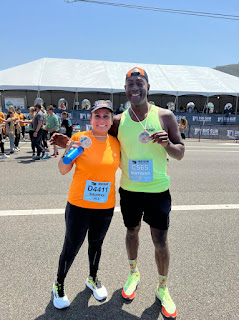Running on the Ragged Edge of the Western World
A gradual progression in a runner’s resume is to run a full marathon (26.2 miles; 42.2 kms) at some point. I was grateful to recently run the Big Sur International Marathon in California. It was one of the toughest and most incredible races. The first time I started thinking about the Big Sur marathon was when I read the ChiRunning book by Danny Dreyer. Danny (who is now 71) ran his first marathon (Big Sur) in 2002 and he landed up finishing it with a podium in his age group (3:04) which was great considering it was the first and that too a race with about a thousand feet of vertical gain on the course! Along with this, my other temptation was to meet my family in California and Chicago and do one of the most scenic marathons in the world– running on the ragged edge of the western world.
There’s nothing like clubbing a marathon with a vacation, meeting family and friends (including my podcast guests) all in one. Running a marathon is a great way to explore different places and you come out accomplishing a lot. The downside of this can also be the anxiety in different cities/countries before a race. One way to enjoy at that moment is not to be attached to the outcome but have gratitude for the fact that you made it there in the VUCA world.
The Big Sur International Marathon is a lottery event where runners from all over the world apply and then some get picked up basis lottery. There is an upper limit to the number of participants. The main reason why runners from different parts of the world get attracted to this race is because it is the most scenic race ever! The course is beautiful and starts with running through the Redwoods, running all along Highway One with the Pacific Ocean on one side and ends in Carmel by the sea.
BSIM (Big Sur International Marathon) was my second full marathon. There was nervousness, excitement and anxiety all bundled together. I met some lovely people at the start line in my corral – some very inspiring who stood there albeit their age or illness. I was drawing energies from all of them. I made some friends along the way, and we shared our pains, suffering and laughter together.
This is not your average marathon where you can aim for PB’s and PR’s. Over 42.2 kms, there are 40 rolling and undulating hills – some very steep. The hurricane point is the highest point and the most dreaded point with strong headwinds. It’s 2 mile (3.2 kms) long. The tougher a race, the more memorable it is.
The race was well organized. The scenery was fantastic with the Pacific on the left most part of the way, the piano man on the famous Bixby bridge playing “chariots of fire”, the taiko drummers, the volunteers, music, the big fat strawberry at mile 23 (37 kms) and the entire atmosphere was great. There were no spectators apart from a few people who lived along the way who came out to cheer us and some with their dogs who they called “therapy dogs”.
I ended the race with a smile, with my family cheering me on the side. It was a “runners high” moment. I just wanted to complete it within the time limit which I did.
Big Sur was a bucket list race and I’m so happy I was able to run it in these times from across the ocean. The views were truly unbelievable. Looking back at my training, I am glad I ran whatever hills I could that were available to me (thanks to my coach), showed up every day to train and ran in higher temperatures which helped me sail through the race slowly and steadily.
Thank you for reading my experience. Have gratitude and don’t lose your passion.


















Comments
Post a Comment